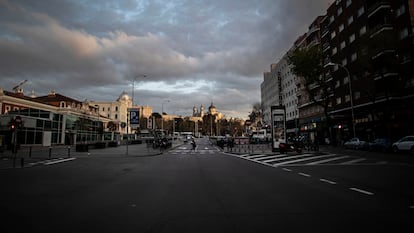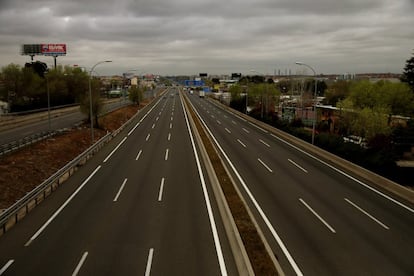Pollution in Spain falls to record lows amid coronavirus lockdown
The concentration of nitrogen dioxide in Madrid and Barcelona has dropped significantly since the Spanish government declared a state of alarm last week


As in China and Italy, the stay-at-home orders issued by the Spanish government on March 14, following the declaration of a state of alarm that placed the entire country on lockdown, has led to a sharp drop in pollution. The impact has been particularly significant in Madrid and Barcelona, where the levels of nitrogen dioxide, caused by traffic and fossil fuel power, plummeted during the first days of lockdown and are now at “historic lows” in both cities, according to a report by the environmental group Greenpeace.
In Madrid, for example, the average level of nitrogen dioxide recorded on March 17 was almost 75% lower than the previous week. In Barcelona, it fell by over 45%, according to data gathered by Adrian Fernández, the head of Greenpeace’s Mobility campaign. Although Fernández points out that weather conditions must also be taken into account as a storm at the start of the week helped improve air quality, he says the reduction in pollution is clearly linked to the reduction in traffic, which has fallen by around 60% in both regional capitals.
We will not fight climate change with a virusUnited Nations Secretary-General António Guterres
The conclusions drawn by Greenpeace are similar to those drawn by NASA and the European Space Agency in China and Italy after measuring pollution levels in the countries via satellite. The European Commission’s Copernicus Atmosphere Monitoring Service reported on March 18 that in northern Italy, “where dense surface observations of the pollutant nitrogen dioxide are available, it is possible to confirm a gradual reduction trend of about 10% per week over the last four to five weeks.” And, according to a report by China’s Ministry of Ecology, in Hubei province, the epicenter of the coronavirus outbreak, the average number of days with good air quality increased during February by 21.5% compared to last year’s figures for that month.
“It is completely logical that there is less pollution,” says Xavier Querol, from the Spanish National Research Council (CSIC). “On Sundays, there is generally less pollution because there is less industry and traffic, and now we have less traffic and industry.” But he warned: “The fight against pollution is a long-distance race, not a sprint.”
Like other experts, Querol is concerned about what might happen when the coronavirus crisis is over and activity resumes. “Everything that has not been done will be tackled and activity will accelerate,” he says, which could mean a rebound effect as seen in previous crises.

During the 2008 recession, global emissions of carbon dioxide, which is the main greenhouse gas, fell by about 1%. But in the years that followed, as measures to stimulate production and demand were implemented, emissions increased again, climbing even faster than before the financial crisis. “We will not fight climate change with a virus,” warned United Nations Secretary-General António Guterres on March 13.
The same could be said about pollution, as levels are not falling due to structural changes, but rather due to measures aimed at slowing the coronavirus outbreak that have paralyzed economic activity. When efforts are in place to revive the economy, Querol believes that it will be difficult to toughen limits on pollution. “Environmental policies are not going to get stricter,” he warns.
English version by Heather Galloway.
Tu suscripción se está usando en otro dispositivo
¿Quieres añadir otro usuario a tu suscripción?
Si continúas leyendo en este dispositivo, no se podrá leer en el otro.
FlechaTu suscripción se está usando en otro dispositivo y solo puedes acceder a EL PAÍS desde un dispositivo a la vez.
Si quieres compartir tu cuenta, cambia tu suscripción a la modalidad Premium, así podrás añadir otro usuario. Cada uno accederá con su propia cuenta de email, lo que os permitirá personalizar vuestra experiencia en EL PAÍS.
¿Tienes una suscripción de empresa? Accede aquí para contratar más cuentas.
En el caso de no saber quién está usando tu cuenta, te recomendamos cambiar tu contraseña aquí.
Si decides continuar compartiendo tu cuenta, este mensaje se mostrará en tu dispositivo y en el de la otra persona que está usando tu cuenta de forma indefinida, afectando a tu experiencia de lectura. Puedes consultar aquí los términos y condiciones de la suscripción digital.








































